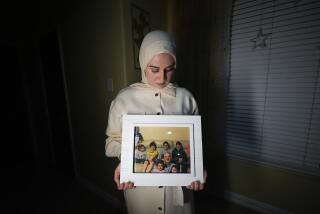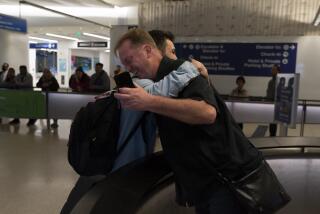Iraqi Is Steadfast in Battling Deportation
- Share via
Inside the federal detention center on Terminal Island, Dr. Ali Yasin Mohammed Karim sat in a drab visitors room and tugged the collar of his red overalls, which identify him as a high-security risk.
“Look,” he said bitterly, “I’m considered an important criminal now.”
According to the U.S. Immigration and Naturalization Service, the stocky physician, who once treated the top echelon of the Iraqi opposition movement, might be a spy for a Middle Eastern power.
More than three years ago, Karim was among a group of six Iraqi dissidents who escaped the wrath of Saddam Hussein’s army only to land in an INS detention center, where they faced deportation to their native soil. Five of them eventually accepted a government offer to be relocated to another democratic country with their families.
But Karim rejected the deal--and now he’s the last man standing. He continues to garner national attention as he fights a government case he says is based on innuendo, secret evidence and guilt by association.
After years of hearings and appeals, his claim that he is innocent is being heard again at the U.S. Immigration Court in San Pedro. If he prevails, he will get the right to apply for political asylum.
“If this were a country like Somalia, I would expect it,” Karim said in a jailhouse interview last week. “But this is the United States. There is the Constitution. This is a democracy. I can hardly believe what has happened.
“It’s so unfair. I did nothing wrong,” he said.
Once a physician who worked for the U.S.-backed Iraqi National Congress, he has passed the last 3 1/2 years reading, keeping in touch with relatives and working with his attorneys, including former CIA Director R. James Woolsey.
The soft-spoken doctor with a gentle demeanor says he was betrayed by the United States in March 1997, when he, his family and 48 other Iraqis boarded an L-1011 bound for California from a refugee center on Guam.
The doctor realized something was terribly wrong the minute he stepped on the plane, he said. Inside were 20 guards and an asylum officer who said after takeoff that they were headed for INS facilities on the mainland--in other words, jail.
As disappointment set in among the passengers, he recalled that his wife, Saliar, turned to him and shouted, “What have you done?”
Karim said that as a direct result of the government’s case, his wife, who was allowed to stay in the United States, divorced him in September 1997. He has not seen his two boys since.
“Only God knows whether I will see them again,” Karim said.
Based on FBI interviews of Iraqi refugees on Guam, the government contended that Karim and five other expatriates kept in detention in Mira Loma might be intelligence agents for Iran, Iraq or Syria. As such, INS attorneys say, they should be denied entry into the United States.
In Karim’s case, the government asserted that his cousin, Aras, a high-ranking member of the Iraqi National Congress, is suspected of being an Iranian intelligence agent. According to the government, the doctor has traveled to Syria and Iran, and might have changed his last name to hide his identity.
The government also claims that Iranian intelligence officers had regular contact with leaders of the Iraqi National Congress. Furthermore, FBI agents thought Karim was deceptive during his screening because he might have lied about the way his brother Mohammed managed to get evacuated from northern Iraq.
That and other information was used against the so-called Iraqi Six at their first immigration hearings in 1997 and 1998. The information was classified, making an adequate defense virtually impossible, according to the doctor’s attorney, Niels W. Frenzen of the Public Counsel Law Center in Los Angeles.
After considering the confidential evidence, Judge D.D. Sitgraves ruled in March 1998 that the Iraqis were threats to national security and should be deported. Frenzen and Karim have likened the hearings to a “kangaroo court.”
“In the middle centuries you can find such a process,” the doctor said. “I had very good expectations about the United States. Now, I don’t. If the INS returns me, it will be a good reward for Hussein.”
Later, with the prodding of Woolsey, the government released about 90% of the information as well as a summary of the still classified portion.
Defense lawyers say the declassified material amounted to little more than rumor. They said the espionage allegations were largely based on uncorroborated reports culled by FBI agents from members of Iraqi opposition groups--a fractious lot.
The secret information shows, for example, that one FBI agent thought Karim might be a spy for Iran, while another agent thought he was a mole for Iraq. The two countries are enemies. In addition, the summary states that Karim’s cousin is suspected of being an Iranian intelligence agent, but it offers no specifics.
Although he says there might be enough legal justification to deport Karim, former INS General Counsel Paul Virtue concedes that the screening and questioning of Iraqi refugees was flawed.
“The whole nature of the FBI exercise gave us pause,” said Virtue, who is now a lawyer in Washington, D.C. “There was some question about what the FBI was accepting as fact. I am sure they did a fine job under the circumstances, but it was a difficult undertaking.”
INS officials in Los Angeles and government attorneys declined to comment on the case.
Armed with the declassified information, defense attorneys managed to persuade the Board of Immigration Appeals to give the Iraqi Six new hearings to determine whether they are national security risks.
But Karim is the only one of the six to request further proceedings. The others settled with the government in June. In exchange for dropping their cases, the INS agreed to relocate the men and their families to other democratic countries. Until then, they will remain under INS house arrest in Lincoln, Neb.
Karim says he rejected the deal as a matter of pride, principle and family. His sons now live in the United States, and he hopes he will be able to renew and maintain his contact with them.
Above all, he says, he wants to clear his name.
“I am innocent. So are the other five--100%,” Karim said. “I could never have imagined the extent to which the government has gone. It is impossible for me to be a spy for Iran, Iraq or Syria. The case is stupid.”
Evidence presented over the last two weeks suggests that the government may have attached nefarious motives to innocent activity, Karim’s attorneys say. Testimony shows that their client’s travel to Syria and Iran was either as a child or to escape military attacks by Hussein.
Witnesses further indicate that Karim has never changed his name, and the Iranian contacts with the Iraqi National Congress were open and tolerated by the United States government. A former CIA section chief stationed in northern Iraq in the mid-1990s testified last week that he never received any information linking the doctor to a foreign intelligence operation.
In court, Karim’s attorneys also have shown that many of the doctor’s relatives have been allowed to stay in the United States despite the government’s concerns about the doctor.
In particular, Karim points out that his cousin, Ahmed Habib Mohammed Kareem, has been allowed into the United States, although he is the brother of Aras whom the government suspects of being an Iranian agent.
Kareem testified last week that he worked for Iraqi Broadcasting Corp., the propaganda arm of the Iraqi National Congress. He lives with the doctor’s mother in Fairfax County, Va.
“Aras’ brother has been granted asylum here,” said Karim, who is troubled by what he says are the government’s glaring inconsistencies. “This is ridiculous. Why only me?”
While he is encouraged by the successes of his attorneys, Karim says he fears the influence of the U.S. government and doubts whether his denials will be considered seriously in court and by the American public.
“Who is going to believe me when INS and FBI officials say all of this?” Karim said. “It shouldn’t be easy to accuse someone of being a spy. It is a serious charge, but it has been very easy for the INS.”
More to Read
Sign up for Essential California
The most important California stories and recommendations in your inbox every morning.
You may occasionally receive promotional content from the Los Angeles Times.













